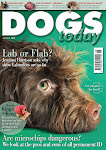I thought we had given both sides on the raw re prepared food debate - but as this reader thinks not, thought I'd share it... What do you think? I think John's views on raw need airing and if anyone wants to engage in debate, this is the place to do it!
Hi Beverley
Hope you don’t mind me emailing this. I wanted to post something on CWN blog but don’t think I can.
I have just finished reading March's
Dogs Today, and after digesting (excuse the pun) your feature on "Read Raw and Still Feeding Cooked" I felt that I really needed to air my views.
Every month I look forward to reading your magazine, but I also get very irritated at "expert" advice on feeding by Mr John Burns. It is more than obvious that he is very against Raw Feeding and I found that article very one sided. John Burns manufactures his own dried food, and hence has more than a personal interest in dishing a raw diet. Why wasn’t a nutritional expert without any vested commercial interest asked to comment, or a view given by Richard Allport to balance the article out?
Yes, I predominantly feed Raw, but also some cooked, some carbs and the occasional naturediet for convenience. I also advise on the feeding section on our forum and never ram Raw down people's throats because I know it's not always for everyone. I tend to advise on the importance of food labelling and value for money versus quality on complete foods. However I find John's forever negativity on raw and the constant comments on the need for Carbohydrates very uninformed. A dog's digestive tract and teeth are designed to eat meat, and bones and they don’t have the digestive enzymes to break down complex carbohydrates like grains. That isn’t ramming Barf down anyone’s throat, that’s just Scientific Canine anatomy fact and as a vet he should know that.
Anyway, feel free to post it if you want to, but I just wanted to get that off my chest.
Many thanks
Cheers
Alison







